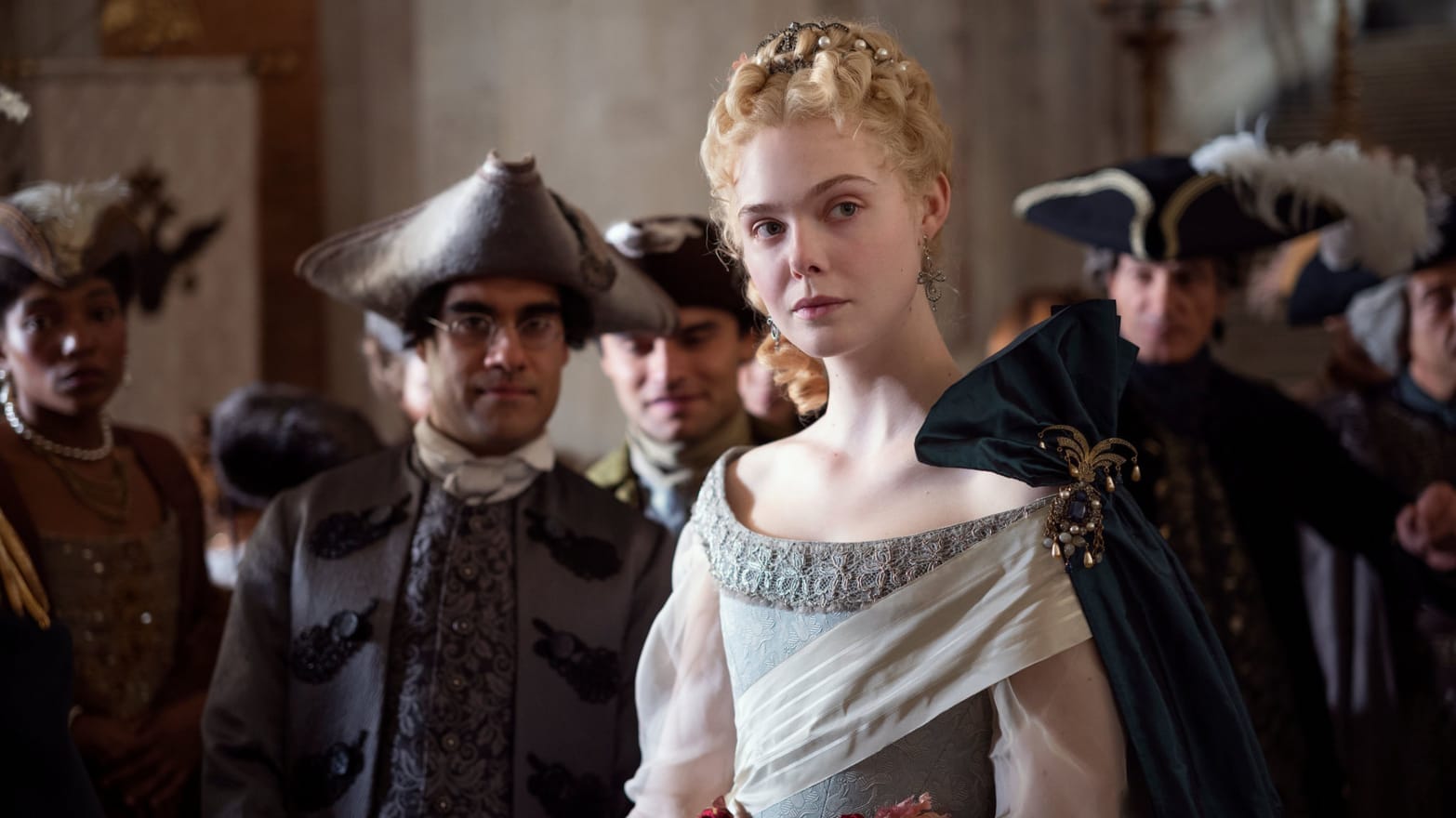Catherine the Great did not fuck a horse. That is the official position of The Great, Hulu’s zany period piece chronicling Russia’s longest-ruling female as she first arrives in the country and enters a loveless marriage to Emperor Peter III, theirs a shitty relationship that plants the seeds to a fruitful reign of power.
Scandalous rumors about the empress’ sexual proclivities—that she was a nymphomaniac, a voyeur, had a bestiality fetish—are as close to urban legends as there comes in the grand scheme of 18th century aristocratic history. Make of it what you will that, when presented with one of the first and most significant female leaders there has ever been, it is trash rumors about her sex life that supersede her legacy.
I’ll leave it to actual scholars of history to clarify the degree of baselessness to those whispers. But suffice it to say that the idea that she and a few equines enjoyed a good roll in the hay—more, that she died while doing it—that is the wildest among them.
Maybe the rumor, which is surmised to have been started by her enemies after her death, has persisted because it is just so deliciously outrageous. Catherine the Great boinked a horse! It is ludicrous, at odds with the prim-and-proper buttoned-up aesthetic that we associate with this time period—at least as we were conditioned to think in 10th grade European history class, and how we’re used to seeing it represented in pop culture.
How smart, then, to take that rumor at face value—tantalizingly salacious, anachronistically ribald, obviously untrue—and turn that into the ethos of a biographical examination of Catherine the Great that is refreshingly, perhaps revolutionarily, and maybe, too, even realistically cheeky. The Great launches Friday on Hulu. Against all expectations I had for the show (10 hours of Russian history, sans any tonal context, sounds like a miserable slog), it is a total, breezy delight.
The 10-episode series was created and written by Tony McNamara, who was nominated for an Oscar in 2019 for his screenplay for The Favourite, which depicted the sapphic triangle between endearingly pathetic Queen Anne (Olivia Colman) and two women in her inner circle (Rachel Weisz and Emma Stone) salivating for power—her “bitches,” as Colman lovingly referred to them. McNamara's script approached it all with a surprising goofiness, lacerated with a sharp wit.
It was dark and whimsical, putting a fish-eye lens on a kaleidoscopic examination of sex, gender, and control in early 18th century England that was just absurdist enough to feel as dangerous as it did hilarious. Director Yorgos Lanthimos, with his meticulous hand and mischievous spirit, was the perfect storyteller for McNamara’s script.
The selling point of The Great, then, is: That whole vibe you liked about The Favourite? Here it is again, but with Catherine the Great. And with this first season focusing on just the early years of her rise to power, there is still plenty of her historic rule to mine content from. So another selling point: What if The Crown, but fun?
The Great is lavish. The production design is top-tier. The sets are jaw-dropping. The costumes will make you drool. The direction is vigorous and alive. The mood is rude.
That last, unexpected twist is the show’s secret sauce.
We first meet Catherine, played by Elle Fanning, as a hopeless romantic, certain that she is going to arrive in Russia, ignite the flame of an all-time great love story with Peter (Nicholas Hoult), and imbue their healthy co-leader relationship with all of the progressive ideas she’s been educated with in Europe.
Upon arrival, however, she learned she was expected to be nothing more than a cum deposit box for a petulant philanderer who needed an heir with respectable lineage. (Crass, yes, but buckle up: It’s exactly in line with the show’s raunchy dialogue.)
The newlyweds detest each other, crushing Catherine, who, while disappointed, was at least shrewd enough to figure out how to work their palatial social distancing pact to her advantage. She’d use her time alone to teach herself principles she’d want to lead with, befriending the correct allies, and plotting a coup against her husband.
Catherine doesn’t have an easy time settling in. The women of the court despise her, finding her snooty and cold. An inspired referencing to that nasty myth, in the series it is those women who start the rumor that she had sex with a horse. They make galloping sounds with their heels when they pass, neighing at her and calling her “horse fucker” to her face. They know how long rumors like this can last, and how they can metastasize into the presumed truth. Guess they were onto something…
What makes The Great work is its nimble exercise in contrasts.
There is an almost hallowed respect for the period, with the care given to replicating the details of everything from the palace to the wigs succeeding to ravishing effect. But there’s also a devious irreverence shrouding the whole thing, from slips of modern dialogue and speech patterns to the chaotic, bawdy comedy.
The pomp and circumstance of the elaborate garb and decorum create a cumbersome ornateness ideal for slapstick. Yet there’s still a palpable air of importance that we’re trained to feel because we are talking about emperors and kingdoms and the erstwhile stuffiness of 18th-century rule, at least as we remember it from textbooks.
Glamour and the grotesque are constantly intertwined. Whatever perception of regality you might have is soiled by the fetid, putrid debauchery at play, aristocrats indulging themselves to squalor. And here we are in a series about an empress, and not two minutes go by without someone talking with shocking frankness about sex.
To that end, the runaway star of The Great is Hoult as Peter, boorish and destructive to the point of being somehow irresistible. He is a walking, talking, constantly fucking id—made all the more insufferable by his incessant intoxication. It is a joy.
Fanning’s Catherine is fastidious in her efforts to rise above it, going from ethereal and hopeful to holier-than-thou and tightly wound until, most gratifyingly, she breaks bad a little bit herself, and her saucier, scheming side comes out. In many of her projects, Fanning can seem to have the effect of a sentient manila folder—not always the most dazzling presence, but does her job holding things together. But, whether it’s the direction, maturing, or the slickness of the material here, this is the most magnetic and crackling she’s ever been.
The fun thing about The Great is that typically costume dramas like this signal something important, that the goal is to be the next great masterpiece or something. It’s all very exhausting. It’s not meant as any disrespect to this series that this does not appear to be the goal here.
The Great boasts great production value and much talent and great care was taken in making it. But even that honorific title seems to be in on the farce of it all. It doesn’t purport to be “The Great” television show of our time, but something enjoyable, provocative, and different. Catherine the Perfectly Delightful.

